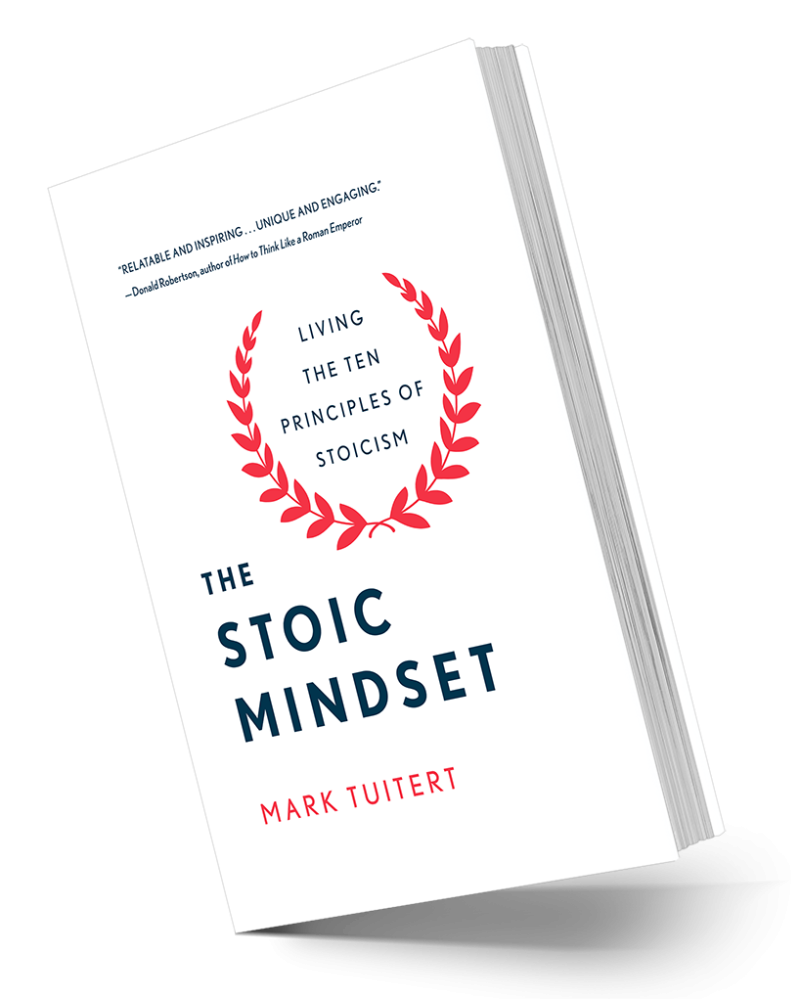What do I mean by a Stoic Mindset?
My mindset is based on the concepts of Stoic philosophy. A philosophy that originated around 300 B.C. in Greece. It was the age of Socrates, Plato and Aristotle. The stoics did not only seek wisdom. At the top of their priority list, was the question of how to live well. Stoic philosophy is characterised by its practical utility. To live well, we must learn to think carefully and be clear about what we consider to be important. How do we make the right decisions? How do we fool ourselves less?
‘I like to call stoicism a realistic philosophy in addition to a practical one’.
Contemporary positivity gurus often emphasize wishful thinking or abstract concepts: “If we want hard enough, we can bend reality to our will”. Stoicism is the opposite of this. Instead, it emphasizes accepting reality and examining your own judgments and thoughts. The goal is to lead your energy and thoughts towards that which you can control in life.
How did Stoic philosophy come about?
Stoic philosophy arose through adversity. Its power lies in applying a certain mindset to bring more resilience, wisdom and calmness into your life. The founder of stoicism, Zeno, experienced a major shipwreck and lost all of his possessions. He decided to focus on his philosophical development and started a school of philosophy at the site of the Stoa: the painted colonnade at the Agora market in Athens. Thus the name stoic philosophy was born. Zeno was a merchant and his followers in stoicism were soldiers, athletes, writers and, even, emperors.
From its Greek origins, Stoic doctrine was carried into the Roman Empire. The Romans gave it their own interpretation, and the most famous stoic writings date from this Roman era. Emperor Marcus Aurelius, in particular, wrote extensively in his personal notes about the stoic lessons he used to cope with wars, pandemics, and treason.
What are stoic views?
A major goal within Stoic philosophy is to live in accordance with the laws of nature. There is no point in worrying about these laws. You can get angry because it’s raining, but that won’t stop the rain. Stoic philosophy helps you discard such useless emotions. Because, only when you experience peace of mind can you truly find fulfilment and meaning. You can train this way of thinking with a stoic mindset.
How do you maintain control of your thoughts with stoicism?
Many of these useless emotions arise from a (in the stoic sense) erroneous way of thinking. An important principle is that you can divide your thinking into the things you can and cannot control. Top athletes often say, “I have no control over my opponents, so there’s no point in worrying about it”. And that’s exactly the point. You cannot change the outcome of a competition, an exam or a job interview. You do have control, however, over your own attitude, so it is wise to focus only on that.
When you can say to yourself that you did everything within your control, you can more easily accept what is out of your control. This thought gives a lot of peace, but is quite difficult to apply. Fortunately, you can train this. Whatever your goal is, put time into your mental preparation and improve yourself every day. Don’t lose yourself in daydreaming, and don’t let your state of mind depend on the outcome you seek.
Your mindset determines how you handle challenges in life. Whether we like it or not, life is constantly changing. By thinking better, we learn to make better choices. In doing so, we lay the foundation for a good life. In my newsletter (Dutch), book and presentations, I share my mindset principles. They help you find direction, meet goals, build resilience and find courage. In doing so, I lean heavily on stoic philosophy and high performance psychology.
How does a stoic take control of emotions?
It is a fallacy to think that stoics train to suppress their emotions or that “stoic” means that you do not show emotions. Emotions are an integral part of being human and are very useful. The trick is not to suffer from those emotions. Ambition is fine, so is pursuing a goal, but not if it takes up your entire life. If we link happiness directly to achieving goals, we haven’t understood what it means to live a good life.
Our peace of mind is independent of the outcome or external circumstances. Peace of mind lies within ourselves, in our thinking and in our choices. Stoics thus try not to be slaves to their emotions. Instead, they examine those emotions and try to ask themselves, “Why am I feeling this way?” “What thoughts are these emotions based on?” Thus, with a stoic mindset, you take charge of emotions instead of suffering from them.
What stoic techniques help to put things in perspective?
The stoics used various techniques to maintain that peace of mind:
- Visualise negative scenarios. So think about how you will deal with setbacks. How do you sustain yourself and stay emotionally balanced? Can you picture yourself doing that as realistically as possible?
- Realise that we are all going to die. This is a hard fact of life, but also a beautiful thought. Out of that realisation comes: let me make today a beautiful day because every day I am getting closer to death. Live deliberately and don’t waste your time on stupid or useless things.
- Embrace destiny. There are plenty of things that cannot be controlled. So worrying or getting angry is pointless. You get in the way of yourself. The only option, however difficult, is to accept your fate. Or if you can manage it, even loving it.
- Observe the objective reality. We put labels on everything; good, bad, great. It helps to put things in perspective. In the end, a nice pie is just a bowl of dough with some sugar. A beautiful car a piece of metal on wheels. And a gold medal is a piece of metal with a yellowish colour.
- Realise that we own nothing, but have everything on loan. By not placing too much value on possessions, stoics train themselves to detach from external factors. Everything in life we have on loan. With that thought, we can remain emotionally calm when something is taken from us, because it was never really ours.
How do you cultivate character with a stoic attitude toward life?
The stoics emphasise what you can control. The choices you make are in your character. In doing so, they use the so-called cardinal values of Socrates: Courage, Temperance, Justice and Wisdom. What you consider good or bad is up to you, but it should never come at the expense of these values. Every day we can make the choice to live a good life, be a good person, and do what is right. This ensures a good and happy life in the long run, rather than the pursuit of money, fame, status or possessions.
The stoics also insist on taking action. We can talk about it nicely, but the real test of character shines through in your actions. A good life must be lived and lessons must be applied. This is why Stoic philosophy appeals to me so much. The stoics are not armchair philosophers. They are the people who test and adjust their ideas in the real world to pursue a better life for themselves and others.
How do I apply stoic philosophy?
‘Just before my Olympic gold medal race, I regularly read texts by Seneca, a Roman statesman and writer. In his texts, he regularly emphasised courage, which did me a lot of good. Whether we win or not is not up to us. Whether we fight bravely, that’s something you do have an influence on. This is the courage you need to overcome fear. Whether you are at the starting line for an important race or have to give an exciting presentation; there is always some form of anxiety in high-pressure situations. A character value like courage is, therefore, important to cultivate’.
‘I myself apply the texts and thoughts of Stoic philosophy as a guide, a system of thought to counterbalance adversity and unpredictability. It helps me give direction to my own dreams and ambitions. With my drive, ambition, and will to win, I am by nature not at all a stoic. But that is precisely why I have been trying to apply this way of thinking for my entire professional career. It helps me mentally get the balance right, the balance I need to live a good life despite the circumstances or results’.
Why is a stoic mindset so important?
We need a mindset that arms us against the harshness and unpredictability of life- a mindset that trains us to find peace and fulfilment as we chase our dreams; a stoic mindset. Not through wishy-washy or spiritual theories, but through a clear system of thought, based on the stoic philosophy of Seneca, Epictetus, Zeno and Marcus Aurelius. A mindset as a weapon to maintain resilience in any situation. You can think of it as the foundation of a training regimen which helps you get the most out of yourself. Whether you fail or win.
“If you don’t know which port you are sailing to, no wind is favorable.
Seneca
‘I coupled the stoic mindset with the techniques I used as an athlete in order to perform at my best. Lessons and principles, which I have found as an entrepreneur, also apply outside the sports arena’. If you want to know what these principles mean and how to train your stoic mindset, sign up for Mark’s newsletter (Dutch) and order his book The Stoic Mindset. You can also book Mark for a seminar or webinar, click here for more information.
Where can I learn more about stoic philosophy?
Stoic philosophy contains a comprehensive system of logic, ethics, and physics. Yet Mark recommends that you start not with the theory, but with the lessons and personal accounts of famous stoic philosophers. The texts below (in addition to The Stoic Mindset) are a perfect start if you want to delve further into Stoic philosophy:
- A brief summary with wise lessons from Epictetus’ Stoic philosophy. You’ll find them in Epictetus’ writings.
- The Meditations of Marcus Aurelius is a wonderful account of the Roman emperor/philosopher. In which he addresses himself, sometimes sternly.
- The Art of Living, from Seneca. His life advice fits well into today’s times. Seneca is the stoic philosopher who I believe is most in tune with our current times. He writes essays on wealth, pleasure, and friendship as life advice to his friends.

